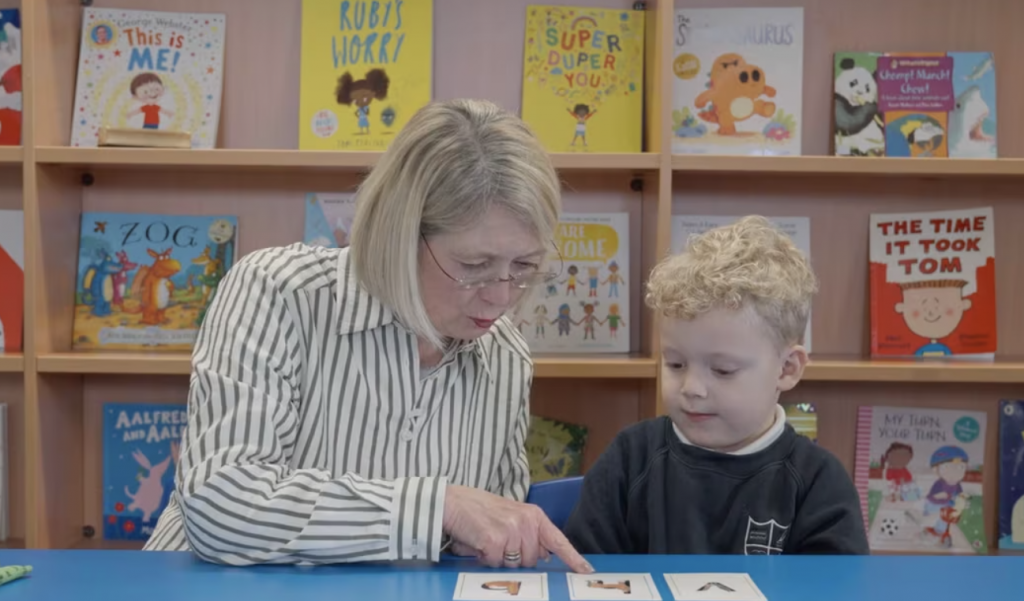We are never complacent. Schools depend upon our teaching programme. We research practices that will work best for all pupils – and especially those with special needs. We struggle on their behalf – struggling pupils are likely to give up. We don’t.
Here’s Jilly, one of our trainers, working with teachers and pupil in Oakwood Special School and Green Park Special School. Watch how much progress these pupils made in just 15 minutes a day.
Seth is eight. His EHCP comes under the umbrella of cognition and learning. In five months, he has learnt 32 letter- sounds and can now blend them to read words independently. He will soon begin to read our Red Storybooks,
Hephzibah is nearly eight. Her EHCP also comes under the umbrella of cognition and learning. She is also non-verbal. In five months, she has learnt 34 letter- sounds and can now blend them to read words in our Red Storybooks
You can see films of many more pupils making wonderful progress on our website and school portal.
Synthetic systematic phonics, rather than a whole word approach, unlocks the English alphabetic code for pupils with learning difficulties. All pupils must learn to read any word: both familiar words and those they meet for the first time. This is a fundamental message in the government’s Reading Framework.
The right teaching
We work with the reading leader and SENCo to make sure that a diagnosis of special needs leads to a successful outcome. Some pupils may take longer to learn, but they can always get there with the right teaching. This is how we become experts – and how we can help you become one too:
Teaching steps: Our teaching steps are small and incremental – for all pupils. We practise these steps until they’re effortless. We then select the right steps to help the pupil make the most progress.
We use additional strategies so pupil with physical disabilities or who are non-verbal can access the same steps.
Connection and repetition: The ‘right’ teaching isn’t just about our getting the steps spot on; it’s about making a deliberate effort to help pupils form a strong connection with the new thing we’re teaching. Memory cannot form without connection. Only with connection can practice strengthen the memory. We teach something new and then review, review, review. And, as the pupil remembers, we quietly affirm their success, minute by minute through the lesson.
Engagement: To learn, pupils must pay attention. We gain their attention by enjoying the activity – and their company. We make our modelling clear and engaging, so they can’t help but join in. If we aren’t enjoying the activity, they won’t be either. And if they’re not enjoying it, they’ll find it hard to focus. This is when pupils withdraw or become badly behaved. And as a result, we are likely to underestimate their potential.
Peace and quiet: We teach in a quiet space, so pupils have the best chance to hear clearly and pay attention. Extraneous noise would hinder their progress. We reduce unnecessary chatter so pupils can concentrate on our modelling – we show pupils what to do, rather than tell them.
Simple routines: Our teaching routines are simple and predictable; our materials are clear and unfussy. There are no distractions.
Commitment: We ensure the same passionate, committed adults work with the same pupils every day. We never give up. We stick with them until they can read.
Visit the website to find out how we can help you.
Or, if you’re already a RMT school – do get in touch with your trainer.
The huge demand for our free online tasters demonstrates the pressure schools are under. We can help you:
- Ensure all SEND tutors can teach Read Write Inc. using online or face-to-face training.
- Set up weekly practice and coaching for SEND reading tutors focusing on the activities that will make the biggest difference
- Make best use of individual progress records for pupil with SEND
- Assess and analyse pupil’s progress using our online assessment
- Design a tailor-made pathway for each pupil, removing any obstacles to learning
- Review and sustain their progress each half-term
- Ensure consistency in SEND provision across your school and trust.
Recent feedback from Reading Leaders on the impact of our Development Days – schools gave us a 100% approval rating.
“Our trainer clearly understood our data and took into consideration the needs of our slowest progress readers to support our reading teachers in the most effective way to speed up progress. She recognised that some of these pupils needed a tailored approach and was able to give specific strategies.”
Sally Welton, Garden Fields Junior and Infant School
“Our trainer supported us with our current cohort of children with severe SEND needs. She was happy to adapt to the urgent support we require. She is always enthusiastic, knowledgeable and really supports our staff and values the work and effort of our team.”
Elena Chambi, Hungerford School
“I valued the practice and coaching of tutoring with identified spotlight children and specific SEND. I also valued the support with organisation of practice and coaching session. Action plan findings and follow up are useful for me as the leader, SLT and governors.”
Kirsty Graham, Robins Lane Community Primary School
“Our trainer supported us to ensure we have correctly identified the children making slowest progress and how best to support them. Coaching and practice time develops teaching practice there and then in the lesson so has an instant impact on children’s learning.”
Katie Rodgers, Ravenfield Primary Academy

